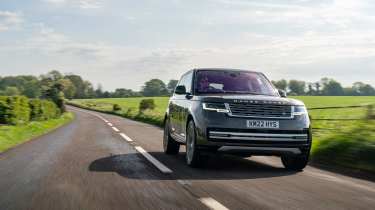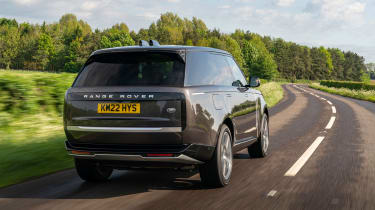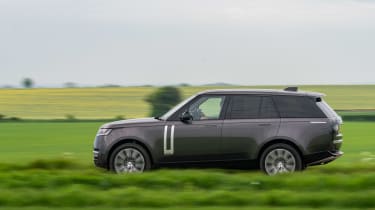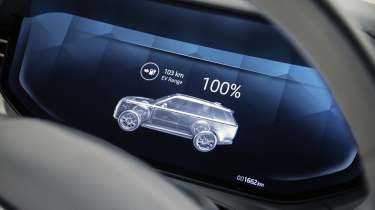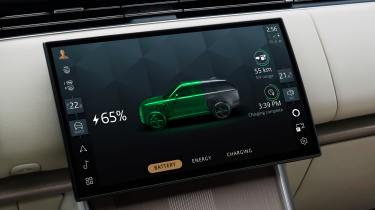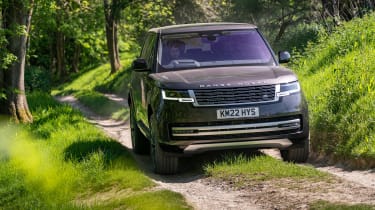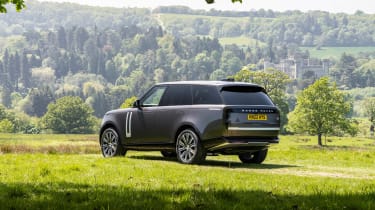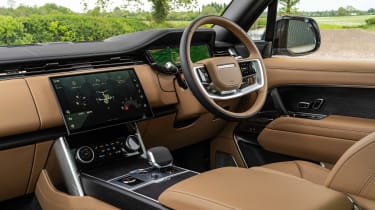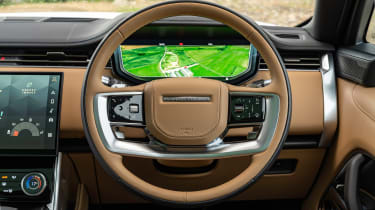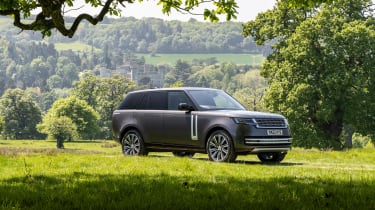Range Rover 2025 review – there’s no need to go electric
The Range Rover remains fit for all purposes and caters to all needs in a market that demands powertrain variety and versatility
As a car that’s not refreshed wholesale all that often, the Range Rover has to be versatile. Never before has that been more difficult, given the changeable industry and market conditions of the moment. Back when the current car first debuted, an electric Range Rover would have been a boon. Now, as the Range Rover Electric’s actual debut looms, the ship seems for now at least, to have temporarily sailed.
How the market will receive it once it goes on sale will be interesting to observe, but it almost doesn’t matter. Why? Because the range as it stands – suitably expanded since the L460’s 2022 debut – really couldn’t speak to the market’s current demands any better. Save for being a little more affordable but then, that’s what the Velar and Sport are for – the Range Rover has pushed well upmarket now, remember. There really is a Range Rover for (almost) all occasions. At least, that’s what we’ve found.
Are you a third-generation Range Rover driver and money is no object? Step right into a P615 V8-engined Range Rover SV, sir. Are you a company car buyer but not ready for an electric car, or just an efficiency conscious driver? Well, the plug-in hybrids will suit you down to the ground. Are you tempted by something like a Bentayga or Cullinan but find them a bit ostentatious and excessively expensive? The Range Rover should be all the luxury car you ever need, but for less folding money and with a more palatable face.
Engine, transmission and technical highlights
The current Range Rover is built around an aluminium monocoque on a platform it shares with the Range Rover Sport. Compared to the fourth-generation car it replaced, however, there’s more steel in the mix, forming transverse rings around the shell at the A-, C- and D-pillars and looping the front door openings, boosting rigidity to the benefit of suspension location and refinement.
More reviews
In-depth reviews
- Range Rover 2025 review – there’s no need to go electric
- Range Rover review (L405, 2012-2021) – verdict, specs and rivals
- Range Rover Sport review
Long term tests
Reviews
The fifth-generation Range Rover is also 53mm longer than the old one with an extra 75mm in the wheelbase. The Range Rover LWB adds another 200mm between the arches and, for the first time on the full-size Range Rover, offers the option of seven seats.
Conversely, the L460 is 11mm narrower across the mirrors, and lower by 10mm. Like-for-like the body-in-white is lighter than that of the last one, but Land Rover ‘spent’ that saving on adding hardware like four-wheel steering. As a result, the new car is a near-2.5 tonne machine at a minimum and in its heftiest LWB form waddles past the 2800kg mark.
Powertrain choices were straightforward on the Range Rover’s introduction but the offering has since opened up, with plug-in hybrids joining the range of diesels and V8s. You can have a 3-litre diesel straight-six in 296 or 345bhp outputs. The delightfully smooth petrol of the same capacity and configuration that made 395bhp with help from a turbo and an electric supercharger has since been dropped from the configurator. You can still have it, albeit with electric assistance in the form of the P460e and P550e PHEV models, with the battery capacity to cover a claimed 70 miles on electricity alone.
Performance and 0-62 time
The trad V8 that replaced the old 5-litre supercharged JLR mill lives on in P530. The 522bhp 4.4-litre twin-turbo lump is a version of BMW’s N63 that powered Bavarian machines of a ‘50i’ flavour for some time. It’s not as charismatic as the old engine but it pulls harder and is claimed to be 17 per cent more efficient. Of course, there’s a certain daft delight in pointing this V8 leviathan at a long straight and getting it to summon distant objects towards you with a muted buffalo bellow. The 0-62mph claims are 4.6sec for the P530 and 4.5sec for the P615, with 'Dynamic Launch' of course.
Nonetheless, the arrival of the PHEVs has brought the nonsense of the token gas guzzler into sharp focus. The 3-litre petrol six is excellent as it was before, only improved with electrical augmentation filling in down low. As your foot goes down, there’s a satisfying thump in the back as the electric power draw dial ahead of you jumps, then recedes in opposing harmony with the ICE as its revs and commensurately your speed, rises.
The P550e might have 542bhp but at over 2.7 tons, it’s got a lot to shift, though 590lb ft from 2000-5000rpm gives the P550e an accessible, linear surge, the two powertrains passing the motive batton with olympic precision. Its performance can safely be described as ‘enough’, which doesn’t say much for the P460e. They manage respective 0-62mph times of 5.0sec and 5.7sec. The diesels without a big lump of battery installed are lighter at just over 2.4 tons and have the low-down punch you expect. You'll need the the D350 with its 516lb ft available between 1500 and 3000rpm, to match the P460e PHEV to 62mph. Needless to say though, it’ll be better for towing.
MPG and efficiency
Dig into the Range Rover P550e’s potency too much and the battery will fall off fast. Driven normally however, we found the car’s range indicator to be solidly dependable, even on the cross-country dash from St Neots to the evo office, though 55 miles indicated on a full charge isn’t the claimed 70.
Does this bode well for the Range Rover Electric, due for reveal before the end of the year? On the one hand, yes. On the other, knowing about the delays it’s suffered, it could go either way. If it appears with 250 miles of claimed range, you just know it’s going to struggle to manage 200 in the real world.
We know more Range Rovers are binge drinkers than not, though. You’ll be doing very well to get 30mpg out of the hybrid on a cruise. In the V8, it’s 25 on a good day. The diesels meanwhile will spend more time in the 30-40mpg range, though there’s no electric option to call upon, which with diligent home charging, can make dino juice fillups in the PHEVs irregular, the silent mileage inexpensive and the overall MPG figure mightily impressive.
Charge the 38kWh battery using a conventional plug and dead to full takes 15 hours. A 7kW wall box or a home charger should do it in five hours, making daily use of electric power, even without making the car charge itself, feasible for those with the right home setup.
Downsides of the hybrid? The car seems a bit too eager, at least in its standard hybrid setup, to switch to electric power when cruising at motorway speeds. Conventional wisdom says that’s where EVs are at their unhappiest, so this is confusing. The solution: put it in ‘save’, which prioritises the ICE and charges the battery. If only the EV, Save and Hybrid modes could be changed with a tactile rotary control or steering wheel buttons, rather than having to dig into the touch screen…
Ride and handling
There’s good news when it comes to dynamics because, there to meet the Range Rover’s muscular range of powertrains is cornering ability to give you decent chance of rounding corners at pace without puckering your optional Kvadrat wool-blend upholstery. That’s thanks to standard-fit four-wheel steering and air suspension allied to a 48V electronic body control system that can apply 1033lb ft of cranking to the anti-roll bars. The best thing you can say about these systems is that you barely notice they’re there.
The 4WS is well calibrated so that, unlike some set-ups, it doesn’t have your inner ear fumbling for the sick bag. You’re aware only of a certain agility and neatness in tighter bends that seems at odds with a car of this size and weight – likewise an unlikely maneuverability in car parks, when it can deploy all 7.3 degrees of counter-steer to give you the tightest turning circle of any Land Rover. On motorways, the rear wheels turn the same way as those at the front for the most imperious of marches across lanes.
The anti-roll systems are subtle too, allowing a certain amount of body movement rather than the eerily flat cornering behaviour of a Xantia Activa so the whole thing feels normal and natural. Also playing its part in the handling department is an active rear diff that’s doing more of the heavy lifting here because, in normal running between 21 and 100mph, the car is rear-wheel drive unless it detects a need to shunt torque to the front axle.
Don’t go thinking that Land Rover has accidentally built a leathery drift machine, however. This is still a tall, two-and-a-half tonne 4x4. You can move across country with more pace than any Rangie before it, and combined with sufficient power you can make Google Maps journey time estimates look a bit pessimistic.
Nevertheless, its size and general bearing don’t encourage limit-challenging antics, even with the subtle tightening of steering and body control reactions and sharpened throttle response brought on by selecting Dynamic mode. Ask too much of the suspension on too rubbish a road at too great a velocity and you’ll have the wheels bouncing and thudding around in the arches, devoid of control as the myriad systems scramble to isolate you from the ensuing carnage. The manner in which you can readily hustle a Porsche Cayenne or Aston DBX just feels rude in the Range Rover – unbecoming and uncouth. Or you could say that next to the new Range Rover, the Porsche Cayenne or Aston DBX would feel too tightly wound.
Driven normally as you should a Range Rover and it’s the picture of serenity – near-flawless ride quality on the 22-inch wheels and all-season tyres, though 23s will negatively impact this.
Interior and tech
The Range Rover has always been about comfort and calm rather than spearing down B-roads, and this latest car, with its superb seats and eerily effective active noise-cancelling tech, is no exception. EV mode in the hybrids really shows off its NVH cancellation skills and its ability to isolate you from the roar of the outside world, without the distant hum of the straight-six to dilute it.
You sit back in the attractively minimalist interior, take a gentle grasp of the big steering wheel, enjoy the view through the big windows, and relax knowing you could cover hundreds of miles without stress. You wouldn’t even need roads to do so, given the platter of Terrain Response options and a wading depth of 900mm. Just be careful not to get mud on your deep pile mohair carpets.
Some things do get in the way of that delicious ‘Range Rover-ness’. Namely, the lack of tactile physical controls. The job of navigating the 13.1-inch PIVI Pro-powered screen (a decent system though it is) to find the climate, media, navigation and drive mode controls does snap you out of the zen-like trance that a waft in a new Rangie will readily put you in. The ergonomics of the wheel controls are fine, though a single panel for all the buttons wouldn't have been our choice. The driver’s display is excellent, though. It’s easily adjusted via the steering wheel, with the customisation options as common-sense as the visual layout.
More physical controls would be more opportunities for wonky quality. For the most part the materials and design are beautiful but there are issues with the fit, finish and some functions. The SV bespoke wheel with the outer rim veneer is for the most part wonderful the P550e test car we had suffered with a volume roller that was so loose it almost felt broken. Happily, most other stuff is fine – a special shout out goes to the shift paddles and the light and wiper stalks, which both feel quality and have a great action.
> Range Rover Sport SV 2025 review – the new king of SUVs?
The wood trim of our car didn’t feel ‘dense’ either, if that makes sense, rather more like a skin laid over some plastic. There’s a tinny echo as you rap your knuckles across some surfaces. But the beautifully stitched, waxy, ebony leather seats welcome you like a warm hug, though their 24-way adjustability with heating, cooling and massage on our car, and similar Executive Class rears were a £4900 option.
Wireless Apple CarPlay and Android Auto are flawless, on new phones at least – more than can be said of quite a few new cars claiming to be so-equipped.
Design
Nothing's changed since the L460 Range Rover's launch in this arena, or will change until the Range Rover Electric launches at least. The whole line could get a visual tickle upon its arrival.
From the front you could dismiss it as derivative of the car it replaced, which is kind of a credit to the timelessness of this design language. Land Rover wanted to hone the Range Rover’s already handsome form into something more upmarket and monolithic. Job done, with ease.
There’s no such confusion from the back, where the slender vertical bar lamps have bedded in nicely, jet black until lit thanks to trick innards with bulbs that face towards the front of the car and bounce their light backwards off internal reflectors. Other neat details include door windows that meet the lower metalwork without a rubber sealing strip and side glass that appears to butt pane-against-pane from the B-pillar back.
It’s a really clean looking car, notwithstanding the gimmicky contrast panel in the front door which cannot be had in body colour, no matter how much you rummage in the vast options list. There’s even a smoother look to the usual Range Rover split tailgate, achieved by making the upper door deeper. The bottom bit still opens downwards to provide a handy seat, something Land Rover has embraced with an optional fold-out backrest surrounded by cupholders, downlighters and speakers. Posho tailgate party this way…
You could lose weeks trying to spec one of these things, dithering over optional satin effect paint finishes, non-leather textile interiors and optional 23-inch alloys, and that’s before you get into the SV sub-range where no rose gold trim, ceramic gear selector or motorised club table is too much to ask.
Prices and rivals
All in even the most cynical of the Range Rover will upon going for a drive, ‘get it’ almost immediately. Serenity and relaxation delivered with ethereal, almost Roman chariot-esque solidity – its anxiety-reducing qualities are little short of addictive. Just make sure you’ve a sports car to park it next to in the garage because it’s still unashamedly a luxury vehicle.
There are plenty of harder, sharper, more aggressive SUVs, but there’s only one Range Rover, a car that combines the silence and space of a limo with the lofty unstoppability of a Defender and now, the upward mobility to stand proud next to Bentleys and Rolls-Royces – there’s no yearning for a Cullinan or a Bentayga when behind the wheel, which is quite the compliment. This is one of many strengths the L460 developed over the last car and, right on form for a Range Rover, its talents haven’t dulled with the years it’s been on sale.
It’s not cheap, kicking off at near-as-dammit £105,000 and soaring past £225,000 if you get busy with some SV bespoke options on a P615 Range Rover SV. But then, there’s really nothing quite like it.
What the current market demands, relative to all the Range Rover can offer, has us wondering where and how the Range Rover Electric can hope to fit in, and what it’ll do better than any Range Rover you can buy today.
